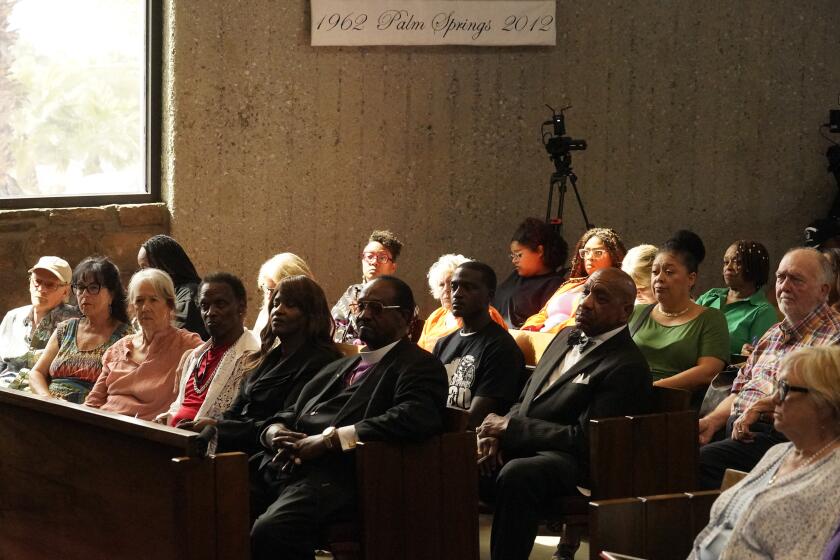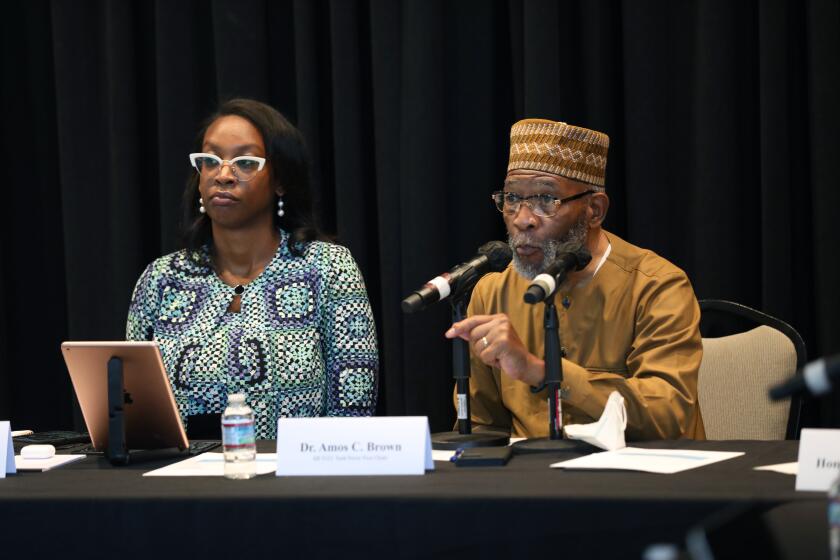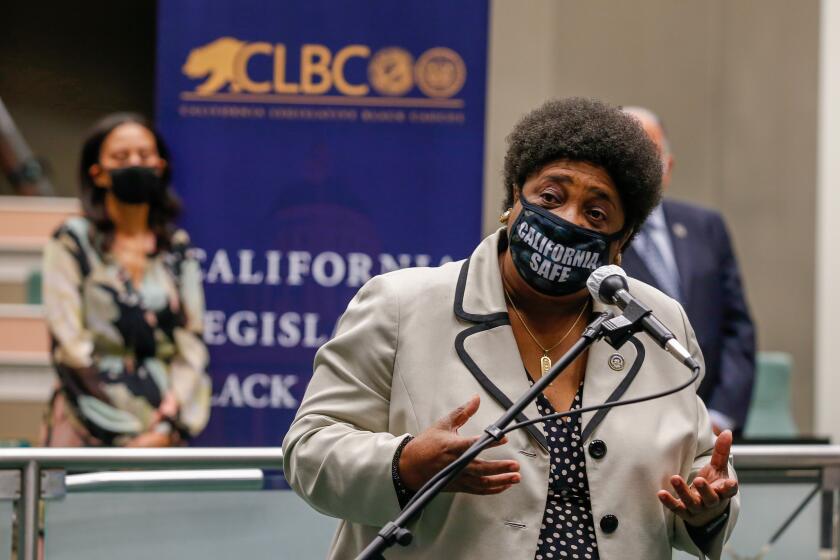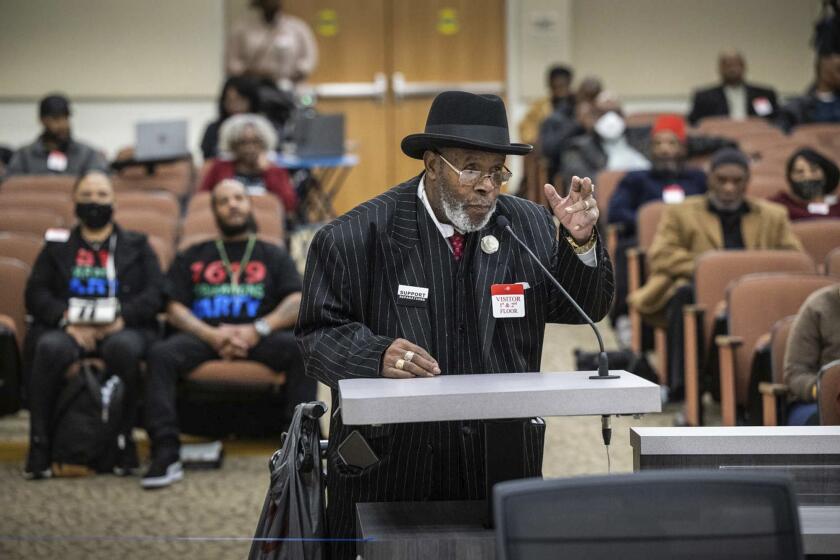Most Californians want reparations for slavery but don’t want to pay cash. Now what?
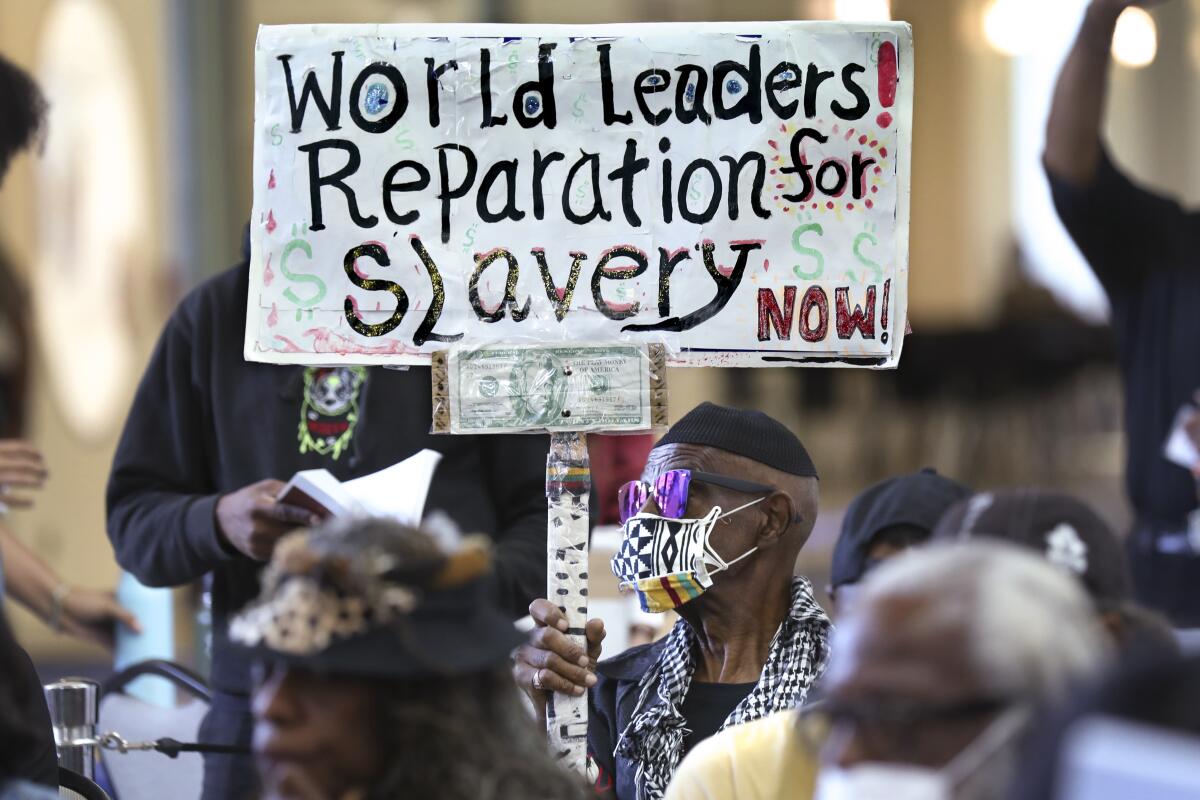
- Share via
For a strong majority of California voters, the question of whether the Golden State should offer cash payments to the descendants of enslaved African Americans has a clear answer: No.
But despite that stark finding, from a new UC Berkeley poll co-sponsored by The Times, most California voters possess a more nuanced view on the lasting legacy of slavery and how the state should address those wrongs. They agreed that slavery still affects today’s Black residents, and more than half said the state is either not doing enough, or just enough, to ensure a fair shake at success.
The debate and commentary over California’s reparations plan, the first of its kind in the nation, has focused largely on cash payments. But the Reparations Task Force created by Gov. Gavin Newsom and state lawmakers in 2020 also recommended more than 100 other policies to help address persistent racial disparities, including reforms to the criminal justice system and the housing market.
Those options, contained in a 1,080-page report on the effects of slavery and the discriminatory policies sanctioned by the government after slavery was abolished, may be taken up next year in the next legislative session, leaving plenty of room to explore the spectrum of opinions that voters have so far expressed, experts said.
“Often, people will be in favor of the principle but not the policy,” said Ange-Marie Hancock, the executive director of the Kirwan Institute for the Study of Race and Ethnicity at Ohio State University and a former department chair of political science at USC. “When you get to the question of what the government should do about it, that’s when the rubber hits the road.”
Richard Malone, a 71-year-old retiree in Rancho Cucamonga who is a registered Republican, said he fears what California’s reparations plan could do to his tax bill. Already, he said, the state is becoming too expensive for people on fixed incomes.
California voters oppose the idea of the state offering cash payments to the descendants of enslaved African Americans by a 2-to-1 margin, according to the results of a new poll.
“I know who will pay: It’s people like me,” said Malone, a retired IRS agent. “It won’t be the rich. It won’t be the poor. It will be all of us in the middle. You don’t have to be a mathematician to know that our taxes will have to go up to pay for this.”
Malone, who is white, said he would rather see California legislators provide “more of a helping hand” to all disadvantaged residents regardless of race. That could include more investment in schools in low-income neighborhoods, he said, as well as a revamp of community colleges and trade schools to create pathways to jobs that will pay “not only a living wage, but a good wage.”
Malone said he supports some reparations, including the 1988 decision to pay $20,000 to each of more than 80,000 Japanese Americans incarcerated by the government during World War II. But he questioned whether Black people who were not enslaved themselves deserve that same treatment.
Malone’s concern echoes the most common reason why most poll respondents opposed cash reparations. Six in 10 said it was unfair to ask today’s taxpayers to pay for wrongs committed in the past, while 53% said it would be unfair to single out one group when other racial and religious groups were also historically wronged. About 1 in 5 said the proposal would cost too much.
Kamilah Moore, the chair of the Reparations Task Force, said she considered it a win that 6 in 10 California voters agreed that slavery still affects today’s Black residents.
She said that negative views on the task force and cash payments were partly shaped by media consumption, especially from right-wing news outlets. Those who vote Republican, own homes and live in rural areas reported hearing about the Reparations Task Force in significantly higher numbers than Democrats, city dwellers and renters.
“The Daily Mail and Fox News and Breitbart have been consistently covering the task force since December of 2022, and that’s when we really started talking about the cash part,” Moore said. “So of course Republicans and conservatives will know more about it.”
Cash payments were slightly more popular among women, younger voters and those born in the U.S.
California’s Reparations Task Force on Thursday released its final report, marking a milestone in the state’s historic effort to consider remedies for slavery.
Moore said she would still like to see a lawmaker introduce a bill on cash reparations so the idea “can be debated in a democratic process.”
California Sen. Steven Bradford (D-Gardena), who sat on the task force, recently introduced a bill that would create the California American Freedmen Affairs Agency, tasked with overseeing and implementing reparations, including cash reparations, and helping people determine their eligibility.
Newsom and state lawmakers reached a $310-billion deal on the state budget, Bradford said, and “if we just put 0.5% into a fund, we can pay for this program.”
Bradford said the California Legislative Black Caucus and members of the task force are also working to write legislation to “address all of those harms that were identified.”
The task force’s recommended remedies go far beyond cash payments, including proposed reforms to the criminal justice system such as ending cash bail, repealing the “three-strikes” law and paying fair market wages to incarcerated people who work in jails and prisons.
The report also touches on policies aimed at unwinding California’s history of racially discriminatory real estate policy, including implementing rent caps, subsidizing down payments in ZIP Codes where Black people were denied home loans and the right to purchase property because of their race, and providing interest-free loans to owners of small businesses in African American commercial areas.
The panel also recommended providing free tuition to California’s public colleges for anyone eligible for monetary reparations, and smaller, community-based efforts, including funding health clinics and building more parks in predominantly Black neighborhoods.
Cheryl Thornton, a public health worker in San Francisco, said she strongly favors the state giving reparations to Black Americans as a way to make amends for decades of systemic racism. She said the state should also do something to help other groups that faced discrimination and oppression, but that she sees a crucial distinction for Black Americans: No other group was enslaved, legally defined as property or brought to the country by force.
In a year of national protests against racial injustice, state lawmakers approved Assembly Bill 3121 to force the state to begin to confront its racist history and systemic disparities that persist today.
Thornton said she felt empathy for Californians who are skeptical about reparations, particularly those who are from other marginalized groups.
“It’s important to recognize that people may have different perspectives and concerns about this complex issue,” she said, adding that “people need to become more knowledgeable. Because they think the playing field is fair, but it’s not.”
Thornton, who is Black, works at the San Francisco Department of Public Health. She and eight other Black women in the department sued their employer in 2020, alleging discrimination toward Black employees. The city settled Thornton’s lawsuit out of court last year for $100,000.
A reparations check from California would allow Thornton to pay off her son’s law school tuition, she said, and help build generational wealth. She suggested that the money could also be used to start or expand their own businesses in their communities.
Tina Mills, a 64-year-old Democrat from Murrieta, said she voted for Newsom and applauded him for creating the task force. But she said she does not support cash reparations, nor does she see it as a winning issue for Democrats.
Mills, who is Latina, took issue with the racial makeup of the task force, which has nine members. Eight are Black, and the ninth is an Asian American civil rights attorney who has advocated for Japanese Americans who were incarcerated during World War II. Mills questioned why the task force was not considering the harm experienced by Latinos and Chinese immigrants in California.
The money might be better spent on strengthening schools in rural and under-served areas, Mills said. Many Black students “are getting a crummy education compared to their peers in Palo Alto and Beverly Hills,” she said.
“I think there’s a significant learning curve,” said Hans Johnson, the president of the East Area Progressive Democratic Club, which has more than 1,000 members in Los Angeles County. The club hasn’t had a formal discussion on reparations yet, he said, but it will take it up before next year’s legislative session in Sacramento.
Sending the final reparations report to Newsom and California lawmakers puts them under political pressure to decide how the state should atone for slavery.
Johnson found the reaction of voters to cash reparations “disappointing but not surprising.” He remains optimistic that other prongs of the reparations recommendations will be more popular.
“I think Californians should be given credit for the ability to make nuanced decisions,” Johnson said.
The Reparations Task Force’s report detailed California’s history with slavery, including Southerners bringing slaves to the Golden State during the Gold Rush to work in mines and perform domestic labor.
California banned slavery in its 1849 Constitution and entered the Union as a “free state” under the Compromise of 1850. But loopholes in the legal system allowed slavery and discrimination against formerly enslaved people to continue.
Census records show about 200 enslaved African descendants lived in California in 1852, though at least one estimate from the era suggested that the population was closer to 1,500 people, according to the task force’s report.
In 1852, California passed a fugitive slave law — rare among free states — that allowed slaveholders to use violence to capture enslaved people who had fled to the Golden State.
Slavery was abolished by the 13th Amendment to the U.S. Constitution in 1865, ratified after the end of the Civil War.
Times staff writer Taryn Luna contributed to this report.
More to Read
Sign up for Essential California
The most important California stories and recommendations in your inbox every morning.
You may occasionally receive promotional content from the Los Angeles Times.
